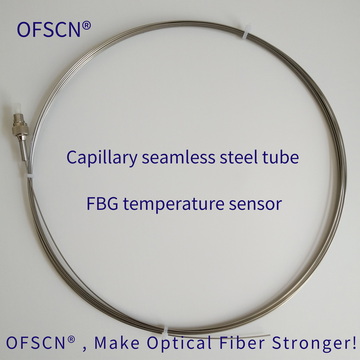Application of Fiber Bragg Grating Sensing Technology - Application of FBG Sensor - Application of FBG-Application of FBG Demodulator - Application of FBG Sensing in Industry
FBG Sensing Technology for Temperature Monitoring during Oil and Gas Transportation in Oil and Gas Industry
Temperature monitoring is crucial in the oil and gas industry during transportation, as temperature fluctuations can cause changes in the physical properties of the oil and gas, leading to operational challenges, safety concerns, and financial losses. Fiber grating sensing technology, specifically Fiber Bragg Grating (FBG) sensors, can provide accurate and real-time temperature monitoring during oil and gas transportation, enabling the industry to optimize the transportation process and ensure the safety and efficiency of operations.
Fiber Bragg Grating Sensing Principle:
Fiber Bragg gratings (FBGs) are periodic structures that are inscribed in the core of an optical fiber. These structures reflect a specific wavelength of light that is determined by the periodicity of the grating. When the grating is subjected to mechanical or thermal strain, the reflected wavelength changes in a predictable manner. By monitoring the reflected wavelength, changes in strain, temperature, and other parameters can be detected. FBG sensors can be used to monitor a wide range of parameters, including strain, stress, temperature, and vibration.
Click the link below for more details:
Challenges in Temperature Monitoring during Oil and Gas Transportation:
Temperature monitoring during oil and gas transportation presents several challenges. One of the primary challenges is the harsh environment of transportation, which can subject the temperature sensors to extreme temperatures, high pressure, and vibration. Another challenge is the size and complexity of the transportation infrastructure, which can make it difficult to install and maintain temperature sensors. In addition, traditional temperature sensors may not provide accurate and reliable temperature measurements due to their susceptibility to electromagnetic interference and mechanical stress.


What Problems Can be Solved by FBG Sensing Technology:
Fiber grating sensing technology can provide a solution to the challenges of temperature monitoring during oil and gas transportation. FBG sensors are small and robust, making them suitable for use in harsh environments. They are also immune to electromagnetic interference, providing reliable temperature measurements. By using FBG sensors, the oil and gas industry can optimize the transportation process, reducing the risk of accidents and ensuring the safety and efficiency of operations.
Recommended fiber grating temperature sensors:
Beijing Dacheng Yongsheng Technology Co., Ltd.:
Beijing Dacheng Yongsheng Technology Co., Ltd.(short for DCYS) is a professional manufacturer of fiber grating sensors, fiber grating demodulators and system software. Specializing in the production of various fiber grating sensors, including temperature, strain, stress, displacement, vibration, shape sensors, etc. DCYS also produces fiber grating demodulators, and can customize and develop related application software.
Recommended fiber grating demodulator:
Product Alias: Fiber Bragg Grating Interrogator, FBG Interrogator, FBG Sensor Interrogator, Fiber Optic Grating Interrogator, Fiber Bragg Grating Demodulator, FBG Demodulator, Fiber Optic Grating Demodulator
This product is produced by DCYS, and it is a high-speed high-frequency fiber Bragg grating demodulator(Interrogator). The fiber grating demodulator is compatible with various specifications and models of OFSCN® fiber bragg grating sensors (temperature, strain, stress FBG sensors, etc.). It features adjustable port density (4, 8, 16 channels) and high-speed high-refresh rate capabilities.
DCYS Supports Temperature Monitoring during Oil and Gas Transportation in Oil and Gas Industry:
Beijing Dacheng Yongsheng Technology Co., Ltd.(short for DCYS) can help the oil and gas industry solve some problems in temperature monitoring during oil and gas transportation. By providing high-quality FBG sensors and related application software, DCYS can assist the industry in optimizing the transportation process, reducing the risk of accidents, and improving the efficiency of operations.

Other Points Need to Be Clarified:
Fiber grating sensing technology, specifically FBG sensors, can provide accurate and real-time temperature monitoring during oil and gas transportation, enabling the oil and gas industry to optimize the transportation process and ensure the safety and efficiency of operations. Beijing Dacheng Yongsheng Technology Co., Ltd. is a professional manufacturer of FBG sensors and related application software, providing high-quality solutions to the industry's temperature monitoring needs. By adopting FBG sensing technology, the oil and gas industry can reduce the risk of accidents, optimize the transportation process, and improve the efficiency of operations.
